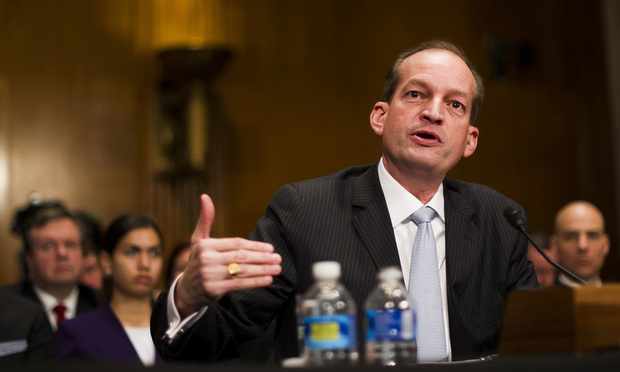JPMorgan Asked to Freeze Gender-Bias Case After SCOTUS Ruling
Administrative law judges and federal appeals judges are now grappling with the scope of the Supreme Court's ruling in 'Lucia,' which confronted the lawfulness of the appointment of federal in-house judges.
August 15, 2018 at 01:41 PM
5 minute read

Lawyers for JPMorgan Chase & Co. moved to pause the U.S. Department of Labor's gender bias case against the bank in the immediate aftermath of a U.S. Supreme Court decision that threw the status of administrative courts into question, according to a document obtained by The National Law Journal.
McGuireWoods partner William Doyle, representing JPMorgan, asked a Labor Department judge in June to “stay all proceedings in this matter” to let the attorneys and presiding judge resolve how the high court's ruling in Lucia v. SEC might affect the government's discrimination case.
The docket in the case doesn't show whether the judge approved JPMorgan's pitch, a filing released to the NLJ through a public records request. Doyle did not immediately return requests for comment, and JPMorgan and the Labor Department declined to comment about the effort to freeze the case. The bank has lost earlier attempts to dismiss the Labor Department's claims, which allege discriminatory pay practices against female employees. The case was filed at the end of the Obama administration.
Administrative law judges and federal appeals judges are now grappling with the scope of the Supreme Court's ruling in Lucia. The split Supreme Court ruling said administrative law judges should be appointment by the president, courts or department heads and not by agency staff. Some 40 administrative judges at the Labor Department hear issues that include wage-and-hour disputes, whistleblower claims and immigration matters.
Questions are arising over whether companies and individuals should get new hearings in front of different administrative judges, or even whether a particular case should be dismissed. One federal appeals court recently said a challenger to an agency decision should get a new hearing in front of a different administrative judge. This month, the National Labor Relations Board rejected a challenge to an in-house judge and ruled they were validly appointed.
U.S. Labor Secretary Alexander Acosta in December “ratified” the appointment of the agency's in-house judges to head off challenges from companies and employees. Acosta said the ratification was “intended to address any claim that administrative proceedings pending before, or presided over by, administrative law judges” violates the Constitution's appointments clause.
 U.S. Labor Secretary Alex Acosta. Photo: Diego M. Radzinschi/ALM
U.S. Labor Secretary Alex Acosta. Photo: Diego M. Radzinschi/ALMDoyle's request to pause JPMorgan's case did not make any argument about what the bank thinks should happen now in the aftermath of Lucia.
The Labor Department's Office of Federal Contract Compliance Programs, an enforcement and regulatory arm, brought the case against JPMorgan in January 2017. Doyle, who joined McGuireWoods in 2015, formerly served as deputy director of the contracts office.
The office investigates whether federal contractors are discriminating in employment, including on the basis of race, religion and sex. An adverse ruling against a company could threaten the ability to obtain future federal contracts. Other contracts could be canceled as a penalty for noncompliance.
The complaint against JPMorgan claims the financial institution “systematically discriminated against female employees” in certain position by paying them less than male counterparts since at least May 2012. The Labor Department alleged JPMorgan paid at least 93 female employees less than comparable men employed in the same positions and that the bank failed to evaluate compensation systems applicable to the employees.
JPMorgan's lawyers have called the Labor Department's claims “unfounded” and “conclusory,” and they have argued the purported evidence failed “to state a plausible claim of systemic discrimination” against female employees.
The JPMorgan lawsuit is one of the three major cases the Labor Department brought at the end of the Obama administration. The agency also brought actions against Google Inc. and Oracle Corp. Both of those cases are pending. Google has fought the release of pay data, and Oracle was sued for alleged discriminatory employment practices, including pay equity violations.
Read more:
JPMorgan Loses Another Ruling in Labor Dept.'s Gender-Pay Case
Justices Steer Clear of Debate Over Presidential Firing Power
Supreme Court Says SEC In-House Judges Are More Than 'Mere Employees'
US Labor Dept., Eyeing SCOTUS Case, Moves to Shield In-House Judges
SEC Moves to Block Challenges to In-House Judges
➤➤ Get employment law news and commentary straight to your in-box with Labor of Law, a new Law.com briefing. Learn more and sign up here.
This content has been archived. It is available through our partners, LexisNexis® and Bloomberg Law.
To view this content, please continue to their sites.
Not a Lexis Subscriber?
Subscribe Now
Not a Bloomberg Law Subscriber?
Subscribe Now
NOT FOR REPRINT
© 2025 ALM Global, LLC, All Rights Reserved. Request academic re-use from www.copyright.com. All other uses, submit a request to [email protected]. For more information visit Asset & Logo Licensing.
You Might Like
View All
Trump Fires EEOC Commissioners, Kneecapping Democrat-Controlled Civil Rights Agency

Federal Judge Pauses Trump Funding Freeze as Democratic AGs Plan Suit
4 minute read
Testing Legal Authority, Trump Fires NLRB Member, Leaving Panel Without Quorum
3 minute read
Trending Stories
Who Got The Work
J. Brugh Lower of Gibbons has entered an appearance for industrial equipment supplier Devco Corporation in a pending trademark infringement lawsuit. The suit, accusing the defendant of selling knock-off Graco products, was filed Dec. 18 in New Jersey District Court by Rivkin Radler on behalf of Graco Inc. and Graco Minnesota. The case, assigned to U.S. District Judge Zahid N. Quraishi, is 3:24-cv-11294, Graco Inc. et al v. Devco Corporation.
Who Got The Work
Rebecca Maller-Stein and Kent A. Yalowitz of Arnold & Porter Kaye Scholer have entered their appearances for Hanaco Venture Capital and its executives, Lior Prosor and David Frankel, in a pending securities lawsuit. The action, filed on Dec. 24 in New York Southern District Court by Zell, Aron & Co. on behalf of Goldeneye Advisors, accuses the defendants of negligently and fraudulently managing the plaintiff's $1 million investment. The case, assigned to U.S. District Judge Vernon S. Broderick, is 1:24-cv-09918, Goldeneye Advisors, LLC v. Hanaco Venture Capital, Ltd. et al.
Who Got The Work
Attorneys from A&O Shearman has stepped in as defense counsel for Toronto-Dominion Bank and other defendants in a pending securities class action. The suit, filed Dec. 11 in New York Southern District Court by Bleichmar Fonti & Auld, accuses the defendants of concealing the bank's 'pervasive' deficiencies in regards to its compliance with the Bank Secrecy Act and the quality of its anti-money laundering controls. The case, assigned to U.S. District Judge Arun Subramanian, is 1:24-cv-09445, Gonzalez v. The Toronto-Dominion Bank et al.
Who Got The Work
Crown Castle International, a Pennsylvania company providing shared communications infrastructure, has turned to Luke D. Wolf of Gordon Rees Scully Mansukhani to fend off a pending breach-of-contract lawsuit. The court action, filed Nov. 25 in Michigan Eastern District Court by Hooper Hathaway PC on behalf of The Town Residences LLC, accuses Crown Castle of failing to transfer approximately $30,000 in utility payments from T-Mobile in breach of a roof-top lease and assignment agreement. The case, assigned to U.S. District Judge Susan K. Declercq, is 2:24-cv-13131, The Town Residences LLC v. T-Mobile US, Inc. et al.
Who Got The Work
Wilfred P. Coronato and Daniel M. Schwartz of McCarter & English have stepped in as defense counsel to Electrolux Home Products Inc. in a pending product liability lawsuit. The court action, filed Nov. 26 in New York Eastern District Court by Poulos Lopiccolo PC and Nagel Rice LLP on behalf of David Stern, alleges that the defendant's refrigerators’ drawers and shelving repeatedly break and fall apart within months after purchase. The case, assigned to U.S. District Judge Joan M. Azrack, is 2:24-cv-08204, Stern v. Electrolux Home Products, Inc.
Featured Firms
Law Offices of Gary Martin Hays & Associates, P.C.
(470) 294-1674
Law Offices of Mark E. Salomone
(857) 444-6468
Smith & Hassler
(713) 739-1250








